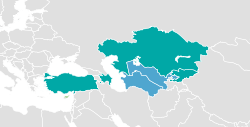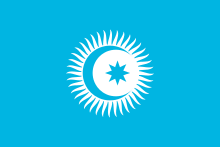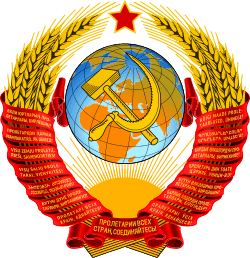Turkic Council
| Cooperation Council of Turkic-Speaking States (Turkic Council)
|
||||
|---|---|---|---|---|
|
||||
 |
||||
| Headquarters |
| |||
| Official languages[1] |
||||
| Member states[2] | ||||
| Leaders | ||||
| • | Secretary-General | Ramil Hasanov | ||
| Establishment | 3 October 2009 | |||
| Website turkkon |
||||
| a. | General Secretariat. | |||
| b. | Parliamentary Assembly. | |||
| c. | Turkic Academy. | |||
The Turkic Council (Azerbaijani: Türk Şurası; Kazakh: Түрік кеңесі; Kyrgyz: Түрк кеңеш; Turkish: Türk Keneşi) or, in full, the Cooperation Council of Turkic-Speaking States (CCTS; Turkish: Türk Dili Konuşan Ülkeler İşbirliği Konseyi), is an international organization comprising some of the Turkic countries. It was founded on 3 October 2009 in Nakhchivan. The General Secretariat is in İstanbul, Turkey. The member countries are Azerbaijan, Kazakhstan, Kyrgyzstan, and Turkey. The remaining two Turkic states, Turkmenistan and Uzbekistan are not currently official members of the council due to their neutral stance; however, they are possible future members of the council.[3] The idea of setting up this cooperative council was first put forward by Kazakh President Nursultan Nazarbayev back in 2006.
History
For centuries, Turks shaped global history in their own particular way. They built and ruled numerous empires and states in the vast area stretching from Europe to India. Today Turkic States have entered a period of close cooperation, building stronger and sounder relations, and designing their common future together. The most important achievement of Turkic cooperation, as well as an indispensable prerequisite for its future development, is the establishment of the Cooperation Council of Turkic Speaking States or, simply, Turkic Council. Turkic Council is an intergovernmental organization whose overarching aim is promoting comprehensive cooperation among Turkic States. The organization was established on October 3, 2009 by the Nakhchivan Agreement signed among Azerbaijan, Kazakhstan, Kyrgyzstan and Turkey. According to Halil Akinci, the founding Secretary-General of the organization "Turkic Council has become the first voluntary alliance of Turkic states in history".
Mission and objectives
The Preamble of the Nakhchivan Agreement reaffirms the will of Member States to adhere to the purposes and principles enshrined in the Charter of the United Nations, and defines the main objective of the Turkic Council as further deepening comprehensive cooperation among Turkic Speaking States, as well as making joint contributions to peace and stability in the region and in the world. Member States have confirmed their commitment to democratic values, human rights, the rule of law, and principles of good governance.
The Nakhchivan Agreement sets out the main purposes and tasks of the Organization as follows:
- Strengthening mutual confidence and friendship among the Parties;
- Developing common positions on foreign policy issues;
- Coordinating actions to combat international terrorism, separatism, extremism and cross-border crimes;
- Promoting effective regional and bilateral cooperation in all areas of common interest;
- Creating favorable conditions for trade and investment;
- Aiming for comprehensive and balanced economic growth, social and cultural development;
- Expanding interaction in the fields of science, technology, education, health, culture, sports and tourism;
- Encouraging interaction of mass media and other means of communication;
- Promoting exchange of relevant legal information and enhancing legal cooperation.
Structure and operation
Main organs of the Turkic Council include:
- Council of Heads of State
- Council of Foreign Ministers
- Senior Officials Committee
- Council of Elders (Aksakals)
- The Secretariat
The main decision-making and governing body of the Turkic Council is the Council of Heads of State, which is presided over by the President whose country holds the chairmanship. The chairmanship rotates on an annual basis. All activities of the Turkic Council are coordinated and monitored by its Secretariat, which is located in Istanbul in accordance with the Nakchivan Agreement. Presidents meet once a year in a previously determined Turkic city. Senior officials, Aksakals, as well as other Ministers and government officials, all meet on a regular basis.
Projects
Since its founding agreement defines comprehensive cooperation among Turkic States as the organization’s main objective and raison d'être, the Turkic Council is working on a whole variety of projects. The projects are grouped under six cooperation processes, which are: economy, culture, education, transport, customs, and diaspora. Examples of the projects include establishing the Turkic University Association and writing a common history textbook. The Turkic Council also works on ways to boost economic development in underdeveloped regions of Member States. The Secretariat brings together Economy Ministers, Education Ministers, Transport Ministers, Heads of Customs Administrations, and other senior officials from different ministries and agencies in order to work on ways to promote cooperation in relevant spheres. Prior to being brought before ministers and heads of administrations, projects and issues of cooperation are elaborated by working groups. One recently launched project is the establishment of a mechanism for closer cooperation among Turkic diasporas all over the world.
Affiliated bodies and organizations

The Turkic Council functions as an umbrella organization for all other cooperation mechanisms like:
- the Parliamentary Assembly of the Turkic Speaking Countries (TURKPA) (administrative capital, Baku)
- the International Organization of Turkic Culture (TURKSOY) (administrative capital, Ankara)
- International Turkic Academy (administrative capital, Astana)
- Turkic Cultural Heritage Fund
- Center of Nomadic Civilizations (administrative capital, Bishkek)
- Turkic Business Council (administrative capital, İstanbul)
Summits
Following the dissolution of the Soviet Union, the newly independent Turkic States of Azerbaijan, Kazakhstan, Kyrgyzstan, Turkmenistan and Uzbekistan as well as Turkey organized Summits of the Heads of Turkic Speaking States, the first of which took place in 1992 in Ankara. With the establishment of Turkic Council, at the 10th Summit it was decided to rename the top-level meetings to Turkic Council Summits.
Turkic Council Summit is the highlight of the year whereby Heads of State evaluate outcomes of the past period and set goals for the next year. The First Summit took place in Almaty, Kazakhstan, on 20–21 October 2011 and focused primarily on economic cooperation. The Second Summit was held in Bishkek, Kyrgyzstan, on 22–23 August 2012 and concentrated on educational, scientific, and cultural cooperation. The Third Summit took place on 15–16 August 2013 in Qabala, Azerbaijan with a theme of transport and connectivity.[4]
International cooperation
Turkic Council is an observer at the Economic Cooperation Organization. The Organization has also applied for an observer status at the United Nations and the Organization of Islamic Cooperation. Besides, Turkic Council maintains close cooperative relations with the Organization for Security and Co-operation in Europe and the Conference on Interaction and Confidence-Building Measures in Asia.
Members
| Country | Population | Area (km²) | GDP (nominal) 2013[5] | GDP per capita (nominal) 2013[6] | Projected GDP per capita (nominal) (2019) [6] |
|---|---|---|---|---|---|
| | 9,552,500 | 86,600 | $74 billion | $7,812 | $11,674 |
| | 17,377,800 | 2,724,900 | $232 billion | $13,509 | $20,609 |
| | 5,776,570 | 199,900 | $8 billion | $1,280 | $1,898 |
| | 76,667,864 | 783,562 | $822 billion | $10,721 | $13,301 |
| | 109,374,734 | 3,794,962 | $1136 billion | $10,411 | $13,718 |
Possible future members
| Country | Population | Area (km²) | GDP (nominal) | GDP per capita (nominal) (2014) [7] |
|---|---|---|---|---|
| | 29,559,100 | 447,400 | $62.64 billion | $2,090 |
| | 5,110,000 | 488,100 | $47.93 billion | $8,020 |
| | 301,988 | 3,355 | $4.27 billion | $15,302[8] |
Events
| 1992-10-30 | | Ankara | First Summit |
| 1993-07-12 | | Almaty | the Almaty Agreement for founding TURKSOY |
| 1994-10-18 | | İstanbul | Second Summit |
| 1995-08-28 | | Bishkek | Third Summit |
| 1996-10-21 | | Tashkent | Fourth Summit |
| 1998-06-09 | | Astana | Fifth Summit |
| 2000-04-08 | | Baku | Sixth Summit |
| 2001-04-26 | | İstanbul | Seventh Summit |
| 2006-11-17 | | Antalya | Eighth Summit |
| 2008-11-21 | | İstanbul | the Istanbul Agreement for founding TURKPA |
| 2009-10-03 | | Nakhchivan | Ninth Summit, the Nakhchivan Agreement for founding the Turkic Council |
| 2010-09-15 | | İstanbul | Tenth Summit (The end of Non-Corporate Summits of Turkic-Speaking Countries State) |
| 2011-10-21 | | Almaty | First Turkic Council Summit, Cooperation in Economic Area and Trade Area |
| 2012-08-23 | | Bishkek | Second Turkic Council Summit, Cooperation in Education, Science and Culture[9] |
| 2013-08-16 | | Qabala | Third Turkic Council Summit, Cooperation in Transportation[10] |
| 2014-06-05 | | Bodrum | Fourth Turkic Council Summit, Cooperation in Tourism[11] |
| 2014-12-24 | | Kiev | Opening of the first Turkic Council Regional Diaspora Center[12] |
| 2015-09-11 | | Astana | Fifth Turkic Council Summit, Cooperation in Media and Information |
List of Secretaries-General of the Turkic Council
| No. | Name | Country of origin | Took office | Left office | Note |
|---|---|---|---|---|---|
| 1 | Halil Akıncı | | 3 October 2009 | 16 September 2014 | End of extended term |
| 2 | Ramil Hasanov | | 16 September 2014 | Incumbent | |
See also
References
- ↑ "Turk Dili Konusan Ulkeler Isbirligi Konseyi'nin Kurulmasina Dair Nahcivan Anlasmasi" (PDF). Turkkon.org. Retrieved 2014-03-05.
- ↑ "TURKSOY Official Web Site". Turkkon.org. Retrieved 2013-07-07.
- ↑ "Turk Dili Konusan Ulkeler Isbirligi Konseyi'nin Kurulmasina Dair Nahcivan Anlasmasi" (PDF). Turkkon.org. Retrieved 2014-03-05.
- ↑ "Third Summit of the Turkic Council Press Release". Turkkon.org. Retrieved 2014-03-05.
- ↑ 2013, Worldbank, http://data.worldbank.org/indicator/NY.GDP.MKTP.CD
- 1 2 http://www.imf.org/external/pubs/ft/weo/2014/02/weodata/weorept.aspx?pr.x=24&pr.y=10&sy=2010&ey=2019&scsm=1&ssd=1&sort=country&ds=.&br=1&c=912%2C186%2C925%2C916%2C927%2C917&s=NGDPD%2CNGDPDPC%2CPPPGDP%2CPPPPC&grp=0&a=
- ↑ http://data.worldbank.org/indicator/NY.GDP.MKTP.CD
- ↑ http://www.ekonomi.gov.tr/portal/faces/home. Missing or empty
|title=(help) - ↑ http://www.mfa.gov.tr/the-second-summit-of-turkic-council-was-held-in-bishkek.en.mfa
- ↑ http://www.mfa.gov.tr/the-third-turkic-council-summit-meeting-was-held-in-gabala.en.mfa
- ↑ http://www.mfa.gov.tr/declaration-of-the-fourth-summit-of-the-cooperation-council-of-turkic-speaking-states_-5-june-2014_-bodrum_-turkey.en.mfa
- ↑ http://www.turkkon.org/en-US/turkic-council-regional-diaspora-center-is-opened-on-24-december-2014-in-kyiv/301/352/352/1123

